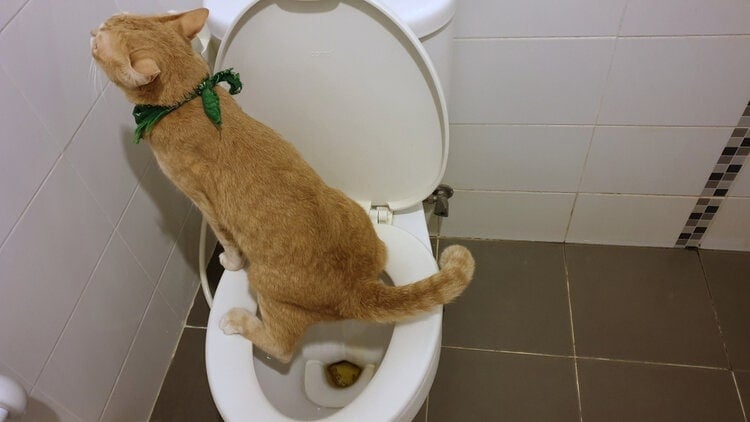Avoid Clogs and Damage: Never Flush Cat Poop Down Your Toilet - Expert Recommendations
Avoid Clogs and Damage: Never Flush Cat Poop Down Your Toilet - Expert Recommendations
Blog Article
Each person will have their own way of thinking with regards to How to Dispose of Cat Poop and Litter Without Plastic Bags.

Introduction
As feline proprietors, it's important to bear in mind just how we deal with our feline buddies' waste. While it may appear practical to flush cat poop down the bathroom, this method can have harmful effects for both the setting and human health.
Ecological Impact
Purging cat poop introduces unsafe pathogens and bloodsuckers right into the supply of water, posing a considerable risk to water environments. These contaminants can negatively influence aquatic life and compromise water top quality.
Health and wellness Risks
Along with environmental issues, purging pet cat waste can likewise present health risks to people. Cat feces might consist of Toxoplasma gondii, a parasite that can trigger toxoplasmosis-- a possibly severe health problem, specifically for pregnant women and individuals with weakened immune systems.
Alternatives to Flushing
Thankfully, there are more secure and much more responsible means to dispose of pet cat poop. Consider the complying with alternatives:
1. Scoop and Dispose in Trash
One of the most common technique of throwing away pet cat poop is to scoop it right into an eco-friendly bag and toss it in the garbage. Be sure to utilize a committed trash scoop and take care of the waste without delay.
2. Usage Biodegradable Litter
Opt for biodegradable feline clutter made from products such as corn or wheat. These trashes are environmentally friendly and can be securely dealt with in the trash.
3. Bury in the Yard
If you have a lawn, take into consideration hiding pet cat waste in a marked location far from veggie gardens and water sources. Be sure to dig deep enough to avoid contamination of groundwater.
4. Install a Pet Waste Disposal System
Buy an animal waste disposal system specifically made for feline waste. These systems utilize enzymes to break down the waste, decreasing smell and environmental effect.
Verdict
Accountable pet ownership extends past supplying food and shelter-- it also includes correct waste administration. By refraining from flushing feline poop down the bathroom and opting for alternate disposal approaches, we can decrease our environmental footprint and safeguard human health and wellness.
Why You Should Never Flush Cat Poop Down the Toilet
A rose by any other name might smell as sweet, but not all poop is created equal. Toilets, and our sewage systems, are designed for human excrement, not animal waste. It might seem like it couldn’t hurt to toss cat feces into the loo, but it’s not a good idea to flush cat poop in the toilet.
First and foremost, assuming your cat uses a litter box, any waste is going to have litter on it. And even the smallest amount of litter can wreak havoc on plumbing.
Over time, small amounts build up, filling up your septic system. Most litter sold today is clumping; it is made from a type of clay that hardens when it gets wet. Ever tried to scrape old clumps from the bottom of a litter box? You know just how cement-hard it can get!
Now imagine just a small clump of that stuck in your pipes. A simple de-clogger like Drano isn’t going to cut it. And that means it’s going to cost you big time to fix it.
Parasitic Contamination
Believe it or not, your healthy kitty may be harboring a nasty parasite. Only cats excrete Toxoplasma in their feces. Yet it rarely causes serious health issues in the cats that are infected. Most people will be fine too if infected. Only pregnant women and people with compromised immune systems are at risk. (If you’ve ever heard how women who are expecting are excused from litter cleaning duty, Toxoplasma is why.)
But other animals may have a problem if infected with the parasite. And human water treatment systems aren’t designed to handle it. As a result, the systems don’t remove the parasite before discharging wastewater into local waterways. Fish, shellfish, and other marine life — otters in particular — are susceptible to toxoplasma. If exposed, most will end up with brain damage and many will die.
Depending on the species of fish, they may end up on someone’s fish hook and, ultimately on someone’s dinner plate. If that someone has a chronic illness, they’re at risk.
Skip the Toilet Training
We know there are folks out there who like to toilet train their cats. And we give them props, it takes a lot of work. But thanks to the toxoplasma, it’s not a good idea.

I recently found that blog entry on How to Dispose of Cat Poop and Litter Without Plastic Bags when doing research the web. Sharing is nice. You won't know, you may very well be doing someone a favor. I am grateful for your time. Don't forget to visit our site back soon.
Visit Report this page